European solutions provider SPIE has been selected to construct the Kork substation in the Kehl area of Baden-Württemberg on a turnkey basis, including the installation of a 380 kV transformer, by the transmission system operator TransnetBW.

The Kork substation is one of a total of six substations that are being modernised, expanded or newly constructed as part of the “Badische Rheinschiene grid reinforcement” measure. Construction will start in January 2022; the plant is expected to be commissioned in the first quarter of 2024.
SPIE Germany & Central Europe is constructing a new 380/110kV substation in Kork in order to stabilise and future-proof the grid supply in the municipality of Kehl. “The new construction serves the security of supply in the Kehl area, where the power grid is heavily utilised. The new 380/110kV substation serves a necessary improvement of grid security,” says Christoph Bausch, responsible project manager from the High Voltage division at SPIE Germany & Central Europe.
The new 380/110kV substation in Kork is part of the “Badische Rheinschiene (NBR) grid reinforcement” project due to its location and connection to the line system between Daxlanden and Eichstetten.
SPIE is responsible for the primary, secondary and civil engineering as well as the associated infrastructure in this comprehensive project. This includes the engineering as well as the ready-to-operate assembly and commissioning of the new substation, which will be erected as an outdoor facility. In addition, SPIE is erecting four 380 kV and two 110 kV cubicles as well as a 380 kV transformer in the new substation.
As general contractor, the multi-technology service provider is also responsible for the construction management of the operations building to be erected. “We are realising a new turnkey transformer station. This means: we plan, control, coordinate, assemble, erect and finally put it into operation. It is a special challenge for our experienced and efficient team to master all tasks within an ambitious schedule. In order to meet these challenges, very precise detailed planning and exact coordination of the various trades is required,” says Christoph Bausch.